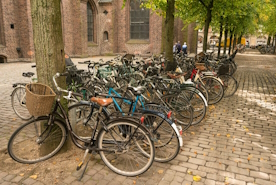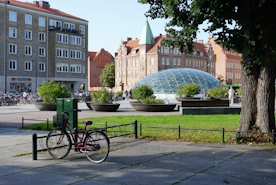
Call 0330 880 3600 Calls may be monitored or recorded. Opening Times.
- TRAVEL INSURANCE
- COVID-19 ENHANCED COVER
- More Options
- Help & Advice
- Existing Customers

Call 0330 880 3600 Calls may be monitored or recorded. Opening Times.


Vienna welcomes both casual and keen cyclists with open arms and open bike lanes. The city is celebrated for its commitment to improving the city’s cycling infrastructure, which already boasts over 900 miles of cycle paths taking you from the historic Ringstrasse to the scenic Danube Canal. The WienMobil rental system is perfectly suited for spontaneous cycling with a modern network of drop-off locations, making it extremely convenient for exploration or commuting. Austria’s capital city is dedicated to sustainable transportation, which not only highlights its status as a bike-friendly destination but also invites every visitor to experience the city’s beauty at their own pace.
 Copenhagen is a city where the bicycle reigns supreme, and where you can experience Danish culture in a unique and immersive way thanks to the well-developed cycling infrastructure. With an extensive network of bike lanes, superhighways, and bridges suited to bicycles, the capital easily facilitates the 1 million kilometres travelled daily by cyclists. The city’s commitment to sustainability continues with initiatives like 'no car days', and Danes show their own appreciation by using their bikes all year round, despite the long and challenging winter season. Experience the convenience of the Bycyklen electric bicycle rental program, which is perfect for tourists looking to explore at their own pace. With bikes outnumbering cars five to one and the popular use of cargo bikes, Copenhagen happily and easily proves its dedication to a cyclist-friendly future, inviting visitors to enjoy its vibrant cycling scene.
Copenhagen is a city where the bicycle reigns supreme, and where you can experience Danish culture in a unique and immersive way thanks to the well-developed cycling infrastructure. With an extensive network of bike lanes, superhighways, and bridges suited to bicycles, the capital easily facilitates the 1 million kilometres travelled daily by cyclists. The city’s commitment to sustainability continues with initiatives like 'no car days', and Danes show their own appreciation by using their bikes all year round, despite the long and challenging winter season. Experience the convenience of the Bycyklen electric bicycle rental program, which is perfect for tourists looking to explore at their own pace. With bikes outnumbering cars five to one and the popular use of cargo bikes, Copenhagen happily and easily proves its dedication to a cyclist-friendly future, inviting visitors to enjoy its vibrant cycling scene.
Paris might not be the first place that comes to mind when you think of a cycle-friendly city, but it’s well on its way to becoming just that. This is mostly down to the introduction of Vélib’, which is the world’s largest bike-sharing initiative - with over 23,500 bikes across 2,000 stations, it’s thought that you’re never more than 300 metres away from a bike. Paris has plans to create a city where every street is bike-friendly, alongside eliminating 60,000 parking spots, with an aim to reduce pollution and enrich the sightseeing experience.
Utrecht is truly a cyclist’s utopia, not only in the Netherlands, but globally, earning the title of the most bike-friendly city in the world according to the Global Bike Index. Cycling is truly at the core of daily life, which is shown by the fact that over 50% of the population cycle regularly, and that even the streets themselves have been repurposed to prioritise bikes over cars. Smart signage, fast lanes, and vast bicycle parking facilities takes the city’s commitment to the next level, and highlights a greener and more sustainable future.
 Malmö is Sweden’s cycling centre, ideal for those with bikes who enjoy flat and expansive landscapes. This city's commitment to cycling presents infrastructure specifically designed for safety and convenience, including bike lanes separate from motor traffic and a variety of rental options, so that visitors can join in the local cycling culture. Malmö has more bicycle pathways than any other Swedish city and this is evident in every aspect, from its massive bike garage at the central train station to cyclist-friendly traffic lights. Uniquely explore the city's charms by bike, from serene seaside jaunts to vibrant city streets, all while contributing to Malmö's green, thriving community.
Malmö is Sweden’s cycling centre, ideal for those with bikes who enjoy flat and expansive landscapes. This city's commitment to cycling presents infrastructure specifically designed for safety and convenience, including bike lanes separate from motor traffic and a variety of rental options, so that visitors can join in the local cycling culture. Malmö has more bicycle pathways than any other Swedish city and this is evident in every aspect, from its massive bike garage at the central train station to cyclist-friendly traffic lights. Uniquely explore the city's charms by bike, from serene seaside jaunts to vibrant city streets, all while contributing to Malmö's green, thriving community.
European cities make exploring on two wheels safe, convenient, and enjoyable, adding a sense of adventure and fun to your journey. Through investments in bike lanes and innovative bike-sharing systems, cities are showing substantial improvements, and moving towards a more eco-friendly, healthier future for urban living.
6th May 2024